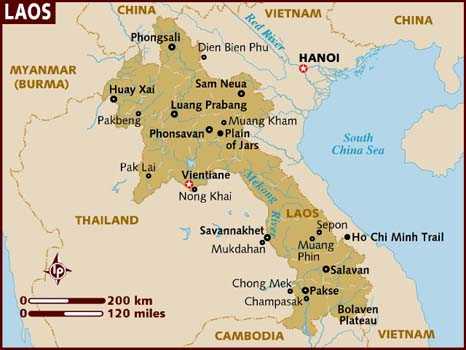Families from the Lao Tribe in the south are leading the way by turning away from a number of non-organic fertilisers that are used widely in the coffee industry to boost crop yields.
Instead, they are using alternatives like homemade fertilisers and pesticides, which are going a long way to improving the quality of their farms and lives.
A long line of farmers
“Our land and soil is very important to us,” says Chon Vilaysak, a coffee farmer and Lao Tribe member living within Bolaven Plateau, which is an elevated region in southern Laos, famous for its coffee production.
“If you use chemicals, you will damage the soil and you won’t be able to grow many things, or you will only end up adding more chemicals in order to grow,” he says referring to problems found within soil treated with chemical fertilisers, including loss of nutrients and poor water retention.
Chon lives with his wife, Nouphai, and their seven children in Nong Luang village and like many of the farmers in this region their entire $8,000 yearly income comes from coffee farming alone.
In total, Chon and his family own 7 hectares of land, the bulk of which they use to farm a mixture of Robusta and Arabica coffee crops, with a little land used for growing fruit trees and vegetables for themselves.
Both he and his wife come from a long line of farmers: Chon’s parents previously harvested rice near the Cambodian border, while Nouphai’s family has a history rooted in coffee.
Teaching sustainable methods
Chon explains how he has always been reluctant to using chemical fertilisers on his crops but it wasn’t until he was taught new green methods by Michael Gomez Wood, the executive director and co-founder of non-profit organisation Fi-lan’thro-pe, that he started to fully benefit from sustainable techniques.
Michael set up the charity with Fi-lan’thro-pe director of Asian programmes Cana Little in 2011 to work directly with indigenous, tribal coffee farmers.
Over the last 6 years, the charity’s goal has been to create a network of communities where sustainable agricultural methods can be shared among farmers to enable them to not only earn more from their crops but ensure they don’t damage their environment for future use.
“We’ll fill every gap in the farmers’ knowledge to move their coffee towards specialty quality coffee,” Michael explains. “Then we’ll connect them with buyers who are willing to pay them a higher price for their product.”
He and Cana are teaching sustainable methods to farmers such as creating organic fertilisers, pesticides and composting.
A number of coffee regions
The fertilisers are made from fermented fruit and plant juice, which is sprayed over the coffee crops to stimulate leaf and cherry growth.
Other innovate techniques that are being used include the creation of biochar – an organic substance that works in a similar way to activated charcoal, which rids humans and animals of toxins.
“Coffee has some of the most valuable waste streams in the world such as the husk, which can be used to make biochar”, Michael says, as explains some of the benefits of using substance.
“The inclusion of 1 per cent of biochar in the farmers’ animal feed, for example, reduces 80 per cent of methane emitted from pigs, and cuts 60 per cent of methane emitted from cows.”
Fi-lan’thro-pe works in a number of coffee regions across the world including the second largest coffee exporter, Vietnam, as well as India and Indonesia.
Most compelling reasons
In Laos, the team works with local translator and environmentalist Eh Nyotkhampheuy, who meets with new and existing Lao farmers to explain the benefits of going sustainable.
“Organic farming is not easy,” admits Eh. “Nowadays farmers want to make fast cash, so they just want something that can grow quickly and sell quickly. They don’t think about the poison of using chemicals or the many benefits to going sustainable.”
For farmers like Chon, who have already made the switch to sustainable methods, the positives heavily outweigh the negatives. Understandably, one of the most compelling reasons for farmers to cut out chemical use is down to price.
“The market requires organic goods and products and if we sell organic coffee, we can sell for a higher price,” says Chon, who estimates that he can get nearly double the amount of money per kilogram for his Robusta beans on the market if they have been organically cultivated.
By cutting out the need to buy non-organic fertilisers and pesticides, farmers are also seriously reducing their outgoing costs.
Coffee cultivation process
But economic incentives aren’t the only reason that these communities are choosing to become sustainable. Chon says a number of farmers in neighbouring villages have had health issues due to the heavy use of chemical fertilisers and pesticides.
“Chemicals cause health problems. Farmers living in a village close by are using chemicals too much, which is causing problems to their health like liver problems. They have to go to hospital often,” he says. Clearly the need to go sustainable isn’t one to be ignored.
The next step now is for Fi-lan’thro-pe to secure funding so some of these families can implement the charity’s zero-waste programme.
This would introduce the likes of animal waste into the coffee cultivation process and create not only further environmental benefits but additional income streams, through the creation of new animal feeds and alternative organic fertilisers.
This would certainly be a game-changer for Lao farmers like Chon and his family, who live in some of the lowest income brackets in the world.
And for Chon this is not only an exciting step but a simple one. “Once you know what sustainable farming is you realise it’s not that hard, we are farmers so this is just our job,” he says. “Land is life.”
Robyn Wilson


















